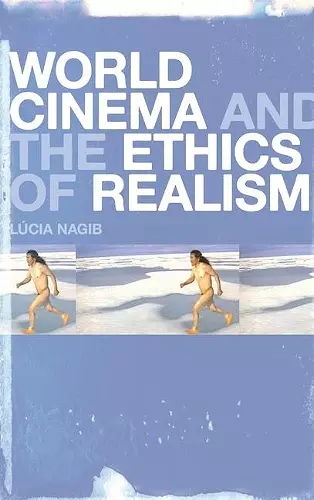World Cinema and the Ethics of Realism
Format:Hardback
Publisher:Continuum Publishing Corporation
Published:24th Mar '11
Currently unavailable, and unfortunately no date known when it will be back

A study of world cinema, illustrating how its creative peaks stem from the urge to reveal otherwise hidden political and social dimensions of reality. It includes case studies drawn from a wide range of realist trends, including the Japanese New Wave, the nouvelle vague, the Cinema Novo, the New German Cinema, and the Inuit Indigenous Cinema.This is a sweeping study of world cinema, illustrating how its creative peaks stem from the urge to reveal otherwise hidden political and social dimensions of reality. "World Cinema and the Ethics of Realism" is a highly original study. It breaks away from the binary divisions which underpin most of film theory, and challenges traditional views of cinematic realism, drawing instead on the filmmaker's commitment to truth and to film's material bond with the real. Nagib conducts comparative case studies drawn from a wide range of realist trends, including the Japanese New Wave, the nouvelle vague, the Cinema Novo, the New German Cinema, the Inuit Indigenous Cinema, the Taiwan New Cinema and the New Brazilian Cinema. She reveals that these creative peaks are animated by the desire to reveal concealed or unknown political, social, psychological or mystical dimensions of reality - as observed in the various cycles of new waves and new cinemas across film history and geography. "World Cinema and the Ethics of Realism" is groundbreaking scholarship that surveys and defines World Cinema not as the opposite of Hollywood, but in positive terms; and draws upon the work of Badiou and Ranciere to take film theory in a bold new direction.
The Ethics of Realism may be too tame a title for the rambunctious scholarship this book contains. Lúcia Nagib has a sharp eye for what, through her lens, become stupefying motifs and moments within films that she just as sharply cuts out of the vast herd of movies. You can sense her pleasure at relaying to us the cinematic power she has found in cast-off ‘failures' like I am Cuba or that she resuscitates in films we thought we knew, such as The 400 Blows. Ultimately tying these to historical struggles of filmmakers and the societies they worked within, she does in fact make good on her title. This is a truly high-minded argument for cinema as the conscience of the past century. The films Nagib illuminates made and kept promises to the world they came from. This book honors the importance, not just the beauty of cinematic art. --Dudley Andrew, R. Selden Rose Professor of Film and Comparative Literature, Yale University
Lúcia Nagib's book World Cinema and the Ethics of Realism injects new vitality and energy into some important but familiar debates in film theory. In the first instance, her surprising selection of films challenges existing concepts of world cinema. More radically, however, these films have a unifying aesthetic out of which Nagib's own approach to realism comes into focus. These are films that privilege rawness and physicality, that place extreme demands on performers and producers, and inescapably work with the reality of event as well as the recording function of the medium itself. Nagib's grounding for the aesthetic of realism is based on an ethical commitment to the living, temporal, spatial and dramatic exchange between the camera as mechanism and the extreme event it is filming. Nagib has successfully turned the theoretical kaleidoscope, reconfiguring the crucial concept of realism, its significance for film theory, into new, exciting, sometimes shocking, patterns of thought and perception. --Laura Mulvey, Department of History of Art and Screen Media, Birkbeck, University of London
ISBN: 9781441137838
Dimensions: unknown
Weight: unknown
312 pages